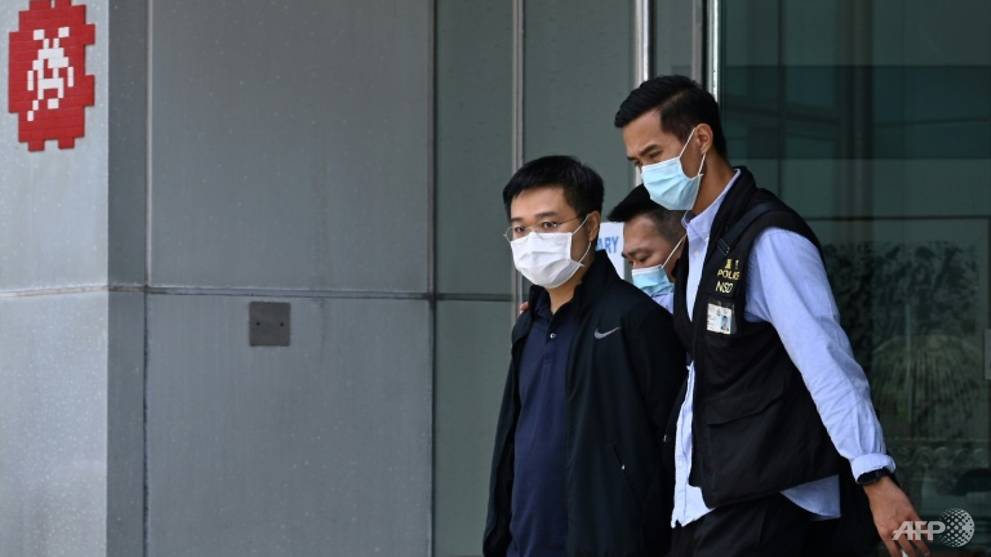
HONG KONG: Two executives from Hong Kong's Apple Daily newspaper appeared in court on Saturday (Jun 19) on charges of collusion and were denied bail after authorities deployed a sweeping security law to target the newspaper, a scathing critic of Beijing.
Chief editor Ryan Law and CEO Cheung Kim-hung are accused of colluding with foreign forces to undermine China's national security over a series of articles that police said called for international sanctions.
As part of their bail application, Law and Cheung had offered to resign their roles at Apple Daily, not speak to media and foreign politicians and pay cash bail - HK$3 million (US$386,463.47) for Cheung and up to HK$200,000 for Law.
Chief magistrate Victor So said there were insufficient grounds "for the court to believe that the defendants will not continue to commit acts endangering national security".
It is the first time the political views and opinion published by a Hong Kong media outlet have triggered the security law, which was imposed last year by Beijing to stamp out dissent in the financial hub.
They will next appear in court on Aug 13.
The pair are accused of colluding with Apple Daily owner and staunch Beijing critic Jimmy Lai between Jul 1 2020 and Apr 3 2021 to request a foreign country, person or organisation "to impose sanctions or blockade or engage in other hostile activities against the Hong Kong Special Administrative Region or the People's Republic of China", according to a charge sheet.
The National Security Law came into force in Hong Kong just before midnight on Jun 30, 2020.
READ: Crowds gather for hearing of two Apple Daily executives on national security charge
More than 500 police officers raided the paper's newsroom on Thursday, carting away computers, hard drives and reporters' notepads.
Five executives were also arrested. Law and Cheung were charged on Friday while the three others - chief operating officer Chow Tat-kuen, deputy chief editor Chan Puiman and chief executive editor Cheung Chi-wai - were released on bail pending further investigations.
"We will still publish the newspaper tomorrow. We will try our best to keep running," said Chan, who attended Saturday's hearing and was speaking outside the court after bail had been denied.
Earlier on Saturday, crowds had gathered outside the court ahead of the hearing, some holding yellow umbrellas or wearing Apple Daily T-shirts saying, "No fear, fight on."
READ: Hong Kong newspaper Apple Daily increases print run after police raid
PLUNGING PRESS FREEDOMS
Multiple international media companies have regional headquarters in Hong Kong, attracted to the business-friendly regulations and free speech provisions written into the city's mini-constitution.
But many are now questioning whether they have a future there and are drawing up contingency plans as Beijing presses on with a broad crackdown on dissent in the city.
Local media have an even tougher time, with journalist associations saying reporters are increasingly having to self-censor.
Hong Kong has steadily plunged down an annual press freedom ranking by Reporters Without Borders, from 18th place in 2002 to 80th this year.
Mainland China languishes 177th out of 180, above only Turkmenistan, North Korea and Eritrea.
Hong Kong and Chinese officials say the arrests were not an attack on the media.
Earlier this week, security secretary John Lee described Apple Daily as a "criminal syndicate".
READ: Future sours for Hong Kong's brazen Apple Daily tabloid
Apple Daily is by far the most outspoken of Hong Kong's pro-democracy media outlets. But it is not clear how long it can survive.
Its wealthy owner Lai, 73, is currently serving multiple jail sentences for his involvement in democracy rallies in 2019.
He has also been charged under the national security law and has had his Hong Kong assets frozen.
Authorities froze a further HK$18 million (US$2.3 million) of Apple Daily's company assets on Thursday.
Police say they also plan to prosecute three companies owned by Apple Daily under the security law, which could see the paper fined or banned.
It is the first time companies, rather than an individual, have faced a national security investigation.
Mark Simon, an aide to Lai who lives overseas, said the paper would have difficulty paying its staff of about 700.
Company lawyers were trying to work out the breadth of the asset freeze order, he added.
"Money is not an issue. Draconian orders from Beijing via the NSL (national security law) are the issue," he told AFP.
https://news.google.com/__i/rss/rd/articles/CBMibGh0dHBzOi8vd3d3LmNoYW5uZWxuZXdzYXNpYS5jb20vbmV3cy9hc2lhL2hvbmcta29uZy1hcHBsZS1kYWlseS1leGVjdXRpdmVzLWRlbmllZC1iYWlsLXNlY3VyaXR5LWxhdy0xNTA0NzMxONIBAA?oc=5
2021-06-19 06:35:16Z
52781673569823
Tidak ada komentar:
Posting Komentar